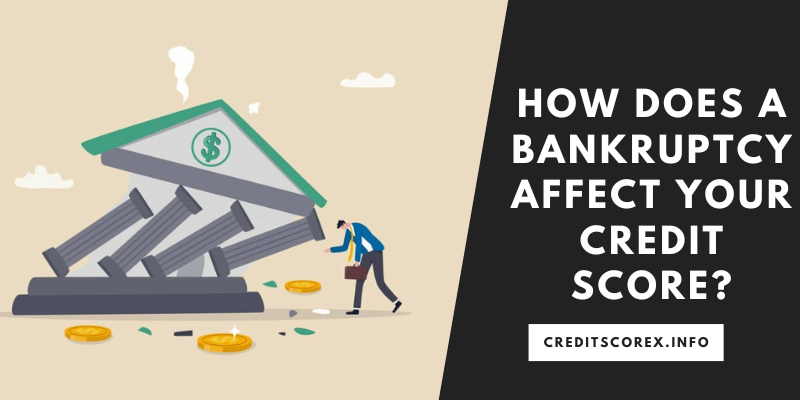Bankruptcy is a significant financial event that can have far-reaching consequences, and one area where its impact is keenly felt is on your credit score. In this article, we’ll explore how bankruptcy affects your credit score, the different types of bankruptcy, and steps you can take to rebuild your credit after experiencing this financial challenge.

1. Understanding Bankruptcy: A Financial Reset
Bankruptcy is a legal process designed to provide individuals or businesses overwhelmed by debt with a fresh start. It involves either the discharge of debts (Chapter 7 bankruptcy) or the creation of a manageable repayment plan (Chapter 13 bankruptcy). While bankruptcy offers relief from debt, it also comes with consequences, particularly in terms of your credit.
2. Immediate Impact on Credit Score: A Significant Drop
One of the immediate and most noticeable effects of bankruptcy is a significant drop in your credit score. The extent of the drop depends on various factors, including your previous credit score, the type of bankruptcy filed, and your overall credit history. Generally, a higher credit score may experience a more substantial decline.
3. Chapter 7 vs. Chapter 13: Differential Impact
The two most common types of bankruptcy for individuals are Chapter 7 and Chapter 13.
- Chapter 7 Bankruptcy: Involves the liquidation of assets to pay off creditors, and any remaining eligible debts are discharged. This type of bankruptcy typically remains on your credit report for ten years.
- Chapter 13 Bankruptcy: Involves creating a manageable repayment plan to pay off a portion of the debt over a specified period. Chapter 13 bankruptcy typically remains on your credit report for seven years.
While both types of bankruptcy have a negative impact on your credit, the duration varies, with Chapter 13 having a slightly shorter impact on your credit report.
4. Rebuilding Credit After Bankruptcy: A Gradual Process
While bankruptcy can be a significant setback, it’s not the end of your financial journey. Rebuilding your credit after bankruptcy is a gradual process that requires patience and strategic financial management.
5. Secured Credit Cards: A Rebuilding Tool
Secured credit cards can be a valuable tool for rebuilding credit after bankruptcy. These cards require a security deposit, which serves as collateral. Responsible use of a secured credit card, such as making timely payments, can demonstrate positive credit behavior and contribute to rebuilding your credit.
6. Timely Payments: The Credit Score Lifeline
Consistently making on-time payments is a crucial factor in rebuilding your credit after bankruptcy. Whether it’s for a secured credit card, installment loan, or other credit accounts, timely payments demonstrate responsible credit management and contribute positively to your credit score over time.
7. Budgeting and Financial Planning: The Foundation
Developing strong budgeting and financial planning habits is essential in the post-bankruptcy phase. Understand your income, expenses, and prioritize saving. Creating a budget helps you live within your means and avoid falling back into a cycle of debt.
8. Monitor Your Credit Report: Stay Informed
Regularly monitoring your credit report is essential as you rebuild your credit. Check for inaccuracies and ensure that all accounts, including those discharged in bankruptcy, are reported accurately. Dispute any errors promptly to maintain the integrity of your credit report.
9. Seek Professional Guidance: Credit Counseling Services
Consider seeking guidance from credit counseling services. These organizations can provide advice on budgeting, financial management, and strategies for rebuilding credit. Working with professionals can offer valuable insights tailored to your specific situation.
10. Time as a Healing Factor: Patience and Persistence
Time is a crucial factor in the credit rebuilding process. While bankruptcy has a lasting impact, its influence diminishes over time. As positive credit behaviors accumulate, and the bankruptcy event moves further into the past, your credit score has the potential to recover.
Conclusion: A Fresh Start on the Horizon
In conclusion, while bankruptcy has a significant and immediate impact on your credit score, it doesn’t define your financial future. By understanding the implications, taking proactive steps to rebuild credit, and adopting responsible financial habits, you can navigate the journey toward a fresh financial start. Patience, persistence, and a commitment to financial well-being are key elements in rebuilding your credit after experiencing bankruptcy.
Leave a Reply